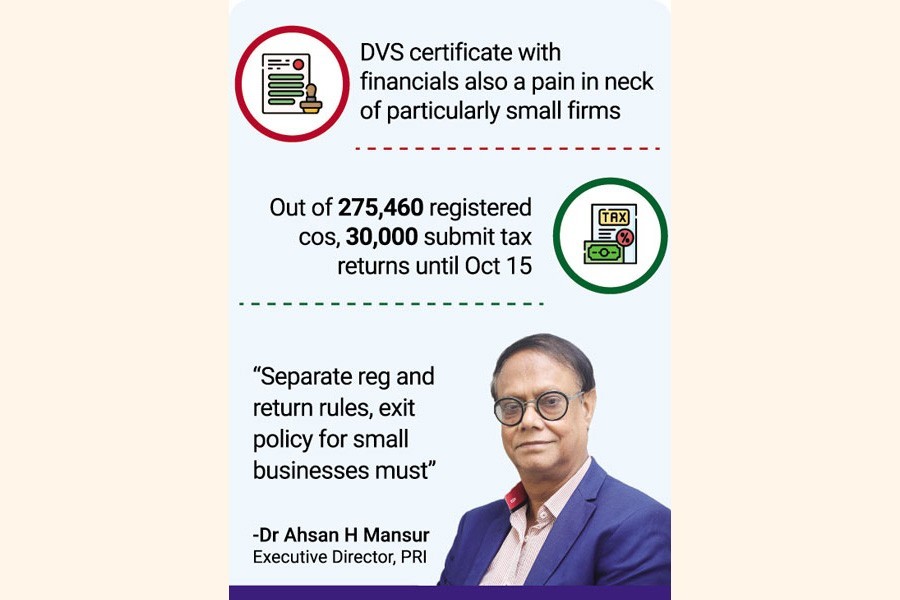Myriad cos caught in limbo for complex exit policy
Taxmen push for return submission as firms cannot wind up

Published :
Updated :

Rahman Hashim stands nonplussed getting caught in clumsy windup process of his inactive company. He is receiving notices from the tax offices regularly for filing tax returns for the company lying in limbo.
He took registration for the firm from the Registrar of Joint Stock Companies and Firms in 2011. Later, he obtained tax and VAT registration, too. During the last five years, he has tried to shut down operations of company closing all documentations.
To him-and myriad others, for that matter-the company-registration system in the country veritably turns a blind alley for complex exit policy.
"Government has focused on simplification of company registration but kept companies' closure process complex," he says.
Three friends, including Mr Hasim, opened the software-development company. Later, his two friends went abroad and he is also hired by a reputed company in Bangladesh.
"It is difficult for me to spend so much time for the sick company," he says about getting caught in the windup tangles.
There is no easy exit policy of the government for companies, he observes, so do economists who say such hassles in closure of companies discourage investment, especially foreign investment in Bangladesh.
Mr Hashim is one of the sufferers among entrepreneurs of thousands of small or sick companies who are looking for simplified exit policy in recent times.
According to RJSC data, the number of registered companies stood at 275,460 as of September 2022. National Board of Revenue (NBR) data show that around 30,000 companies have submitted tax returns until October 15 this year.
By that count around 11 per cent of the registered companies submit tax returns annually in Bangladesh to the revenue authority despite government having made it mandatory for all.
The government in December 2020 made Document Verification System (DVS) mandatory requiring companies to submit chartered accountant-certified financial statements with the tax returns.
The mandatory measure has chain effects as many of the small companies who earlier somehow managed to file tax returns have to prepare valid documents for DVS.
According to business process of RJSC, there are two modes of winding up company: one by court and another voluntary.
Winding up through court requires following eight types of complex procedures, starting from submission of petitions for liquidation, while voluntary winding up needs to follow 11 steps.
A field-level tax official says around 200 of companies under his jurisdiction failed to submit tax returns in the tax year 2021-22 for not having requisite documents from the CAs.
"I have to serve show-cause notices to the companies as per Income Tax Ordinance 1984 despite knowing the reality," he adds.
Tax officials in a data cross-matching survey between the number of taxpayer identification number (TIN) holders and RJSC-registered companies have found many of the company owners having obtained registration for multiple companies and firms but running one or two.
A senior tax official says he has found a company having taken registration for 50 companies but running three currently. As there is no simplified exit policy for the companies, such number of inactive companies is increasing day by day, he concludes.
"As per tax law, taxmen will have to serve notices to those companies having TINs as the tax law has no policy to close the TIN numbers, too," he adds.
Institute of Charted Accountants of Bangladesh (ICAB) developed the Document Verification System in a bid to check window-dressing of financials. Earlier, companies used to prepare multiple financial statements for bank loans, tax returns and other reasons.
President of the ICAB Md Shahadat Hossain says CAs have to maintain accounting standards in auditing financial statements. "Without required documents, the CAs cannot complete audit of the corporate taxpayers' financial statements."
Quality Assurance Department of the ICAB also monitors the CAs' auditing quality.
For DVS system, the companies have to furnish relevant documents and pay minimum fees that many small companies cannot afford, said a field-level tax official.
In the tax returns for 2021-22, all of the corporate taxpayers will have to furnish the financial statements certified by Chartered Accountants having Document Verification Code (DVC).
Dr Ahsan H Mansur, Executive Director of Policy Research Institute (PRI), said the government should frame simplified policy for small businesses on the basis of their threshold.
"It is not feasible to keep similar mandatory rules for small and large companies alike," he added.
There should be separate company registration and tax return-submission rules as well as exit policy for small businesses on the basis of their business thresholds, he said.
doulotakter11@gmail.com


 For all latest news, follow The Financial Express Google News channel.
For all latest news, follow The Financial Express Google News channel.